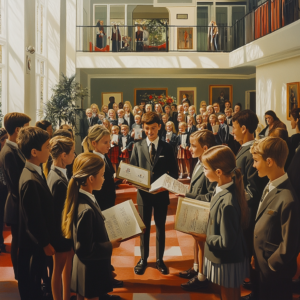Overview of Private School Education in South Africa
Private school education in South Africa offers a diverse range of learning opportunities that cater to different educational needs and preferences. As a dynamic sector of the South African education system, private schools are known for their smaller class sizes, modern facilities, and extensive extracurricular programs. These schools aim to provide a holistic education that focuses not only on academic excellence but also on the development of personal skills and talents.
South Africa’s private school education curricula often has the flexibility to choose from a variety of curricula, allowing them to tailor their programs to better suit the needs of their students. Some may follow the national curriculum, while others offer international options. This flexibility allows them to attract students who are looking for niche educational experiences or who aim to study abroad in the future.
 Parents often consider private school education for its innovative teaching methods, emphasis on individual attention, and diverse subject offerings. Private schools are typically well-resourced, which supports a more engaging and interactive learning environment. Additionally, these schools often emphasize the development of critical thinking, creativity, and leadership skills, preparing students for both local and global challenges.
Parents often consider private school education for its innovative teaching methods, emphasis on individual attention, and diverse subject offerings. Private schools are typically well-resourced, which supports a more engaging and interactive learning environment. Additionally, these schools often emphasize the development of critical thinking, creativity, and leadership skills, preparing students for both local and global challenges.
Overall, choosing a private school education in South Africa can provide students with a strong foundation for their future endeavours, ensuring they are well-prepared for university and beyond. Whether opting for a national or international curriculum, private schools offer the opportunity for a well-rounded education tailored to individual needs.
In South Africa, private schools offer a range of curriculum options, providing families with the flexibility to choose what best suits their child’s needs and aspirations. One popular choice among these institutions is the South African national curriculum, known as the Curriculum and Assessment Policy Statement (CAPS). This curriculum is set by the Department of Basic Education and is designed to ensure a consistent and comprehensive educational experience across the country.
CAPS emphasizes a well-rounded education that covers essential subjects such as mathematics, science, languages, and social studies. It aims to develop critical thinking, problem-solving abilities, and a deep understanding of various academic disciplines. Private schools that follow the national curriculum often enhance it with additional resources and teaching methodologies to enrich the learning experience.
However, some private schools choose to implement educational programs that go beyond CAPS. They might incorporate elements from international curriculums or offer advanced placement options, which are especially appealing for students planning to pursue higher education abroad. This hybrid approach allows schools to maintain national standards while also providing the benefits of a broader, globally recognized educational framework.
Parents considering private school education in South Africa should explore each school’s curriculum offerings, balancing the thoroughness and structure of the national curriculum with potential international options. This ensures that students not only meet national educational benchmarks but also gain skills and knowledge that have relevance in a global context. In this way, private schools can prepare students for both local and international opportunities.
In South Africa, private schools offer a diverse range of international curriculums that provide students with a global perspective on education. These curriculums are designed to meet varying educational goals and accommodate students from multicultural backgrounds. Among the most popular international programs are the International Baccalaureate (IB), the Cambridge International Examinations (CIE), and the American Advanced Placement (AP) courses.
The International Baccalaureate program is renowned for its rigorous curriculum that encourages critical thinking and broad-mindedness. Students engage in subjects spanning the arts, sciences, and humanities, all while developing research skills and humanitarian awareness. This curriculum is particularly favoured by families seeking a well-rounded approach to education with a focus on personal development.
Cambridge International Examinations are widely respected for their academic rigor and flexibility. Rooted in the British education system, CIE offers qualifications like the IGCSE and A-Levels, which are highly regarded by universities across the globe. This curriculum allows students to specialize in selected subjects, providing depth in their areas of interest.
The American Advanced Placement program is another popular choice, offering college-level coursework in a high school setting. AP courses allow students to earn college credits, making them an attractive choice for those planning to continue their education in the United States.
These international curriculums not only prepare students for higher education worldwide but also equip them with the skills needed to thrive in an increasingly interconnected world. As a result, choosing the right international pathway can significantly influence a student’s academic and professional future.
Comparative Advantage: National vs. International Programs
When selecting the right private school education pathway for a child in South Africa, parents often weigh the benefits of national versus international curricula offered by private schools. Each has distinct advantages that cater to different needs and aspirations.
Private schools in South Africa following the national curriculum, known as the CAPS (Curriculum and Assessment Policy Statement), offer a robust academic framework. This system ensures learners meet the educational standards set by the South African Department of Basic Education, making it a good choice for families planning to stay within the country long-term. It emphasizes local culture and history, which can foster a strong sense of national identity and understanding of local issues.
On the other hand, international programs like the International Baccalaureate (IB), Cambridge International Examinations (CIE), and the American SATs are widely popular in South African private schools. These curricula offer globally recognized qualifications, providing students with greater flexibility in choosing universities and career paths abroad. International programs often encourage critical thinking, creativity, and independence, skills that are highly valued in today’s globalized job market.
The decision between national and international curricula in South African private schools hinges on the child’s future ambitions and family plans. While the national curriculum aligns well with local contexts, international programs can open doors worldwide, offering students a broader array of opportunities after graduation. By understanding the comparative advantages of the various private school education curricula, parents can make informed choices that align best with their child’s academic and personal growth goals.
Private schools in South Africa offer a wealth of extracurricular and enrichment opportunities that extend beyond the classroom, nurturing well-rounded individuals. These programs are designed to complement academic learning, enhance personal development, and foster skills that are highly valued in the modern world.
Extracurricular activities in private schools often include sports such as rugby, cricket, swimming, and netball, which not only promote physical fitness but also teach teamwork and perseverance. Meanwhile, creative arts programs, including music, drama, and visual arts, provide an outlet for self-expression and creativity. These activities help students develop confidence and public speaking skills, which are essential in both personal and professional life.
Furthermore, many private schools place a strong emphasis on clubs and societies that cater to a wide range of interests. From debating and robotics to environmental clubs and community service initiatives, these groups encourage students to explore new areas, think critically, and engage in meaningful discussions about global issues.
Enrichment opportunities may also include language courses, leadership workshops, and study tours, which broaden students’ horizons and prepare them for a globalized world. Participation in international competitions and exchange programs can offer additional challenges and unique learning experiences.
These extracurricular and enrichment activities are crucial in developing a student’s social skills, leadership abilities, and cultural awareness. When selecting your child’s private school education, it is important for parents to consider these offerings to ensure their child receives a holistic education that aligns with their interests and passions.
Choosing the Right Curriculum for Your Child
Choosing the right curriculum for your child in a South African private school can significantly impact their educational journey and future opportunities. With a range of options available, parents must consider several factors to ensure the best fit for their child’s needs and aspirations.
 Firstly, understand your child’s strengths, weaknesses, and interests. Some curriculums, such as the national CAPS (Curriculum and Assessment Policy Statement), are more structured and may suit students who thrive in a traditional academic environment. Alternatively, international programs like the Cambridge International or International Baccalaureate (IB) might be more suitable for a child who excels in project-based learning and critical thinking.
Firstly, understand your child’s strengths, weaknesses, and interests. Some curriculums, such as the national CAPS (Curriculum and Assessment Policy Statement), are more structured and may suit students who thrive in a traditional academic environment. Alternatively, international programs like the Cambridge International or International Baccalaureate (IB) might be more suitable for a child who excels in project-based learning and critical thinking.
Another key consideration is the long-term goal. If you envision your child studying abroad, an international curriculum may offer a smoother transition, providing globally recognized qualifications. On the other hand, if your child plans to pursue higher education within South Africa, the national curriculum is well-regarded by local universities.
Additionally, evaluate the extracurricular opportunities offered by the school. These programs can provide a well-rounded private school education, helping to develop skills beyond the classroom and cultivating diverse interests.
Lastly, involve your child in the decision-making process of their private school education. Their comfort and enthusiasm toward the curriculum will play a crucial role in their overall success.
By analysing these factors carefully, you can make an informed decision that aligns with your child’s unique needs, helping them to flourish academically and personally in their private school years.

